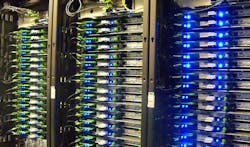Facebook is kicking kicked its infrastructure growth into a whole new gear. Today the company announced that it will build four additional data centers at its cloud campus in Papillion, Nebraska, for a total of six buildings and more than 2.6 million square feet of space to house servers and storage.
The expansion in Nebraska continues a trend in which Facebook is super-sizing the scale of Internet infrastructure, building bigger data centers, and larger cloud campuses. We first reported on last February, and the company’s construction program has accelerating relentlessly ever since.
Since the beginning of 2017, Facebook has announced five new cloud campuses. The social network now has 12 data center campuses around the globe, including nine in the U.S. and three in international markets. Facebook has nearly 15 million square feet of data center space completed or under construction, with several million more feet in the planning stages.
Each of these cloud campuses features enough land to build at least three data centers, and sometimes as many as six. Each data center is approximately 1,000 feet long, and includes multiple data halls, each of which houses tens of thousands of servers that process and store the status updates, photos and videos that are shared by Facebook users.
OCP Summit 2018 on Tap
As it creates its huge global network, Facebook is helping change the way data centers are built, and the equipment that fills them. Facebook shares its data center and IT design innovations publicly through the Open Compute Project (OCP), which it helped found in 2011 to accelerate the open hardware movement. The group has helped the principles of open source software movement be more widely adoptedin IT hardware, particularly among the largest “hyperscale” computing providers.
The OCP community will gather again this week in San Jose for the Open Compute Summit, where we can expect to see new innovations in data center hardware from Facebook and its partners. In 2017, Facebook shared updated designs for its Big Basin AI server and high-density Bryce Canyon storage unit.
Facebook has been scaling up its infrastructure to handle massive growth in user photo uploads, including custom cold storage facilities and the use of BluRay disks to save energy on long-term storage. Video storage can be an even larger and more expensive storage challenge, as HD video files are substantially larger than photos. This has infrastructure implications. VR and 360-degree video applications require a LOT of data, and delivering these experiences across the Internet presents a major challenge. Virtual reality content could be 5 to 20 times the size of today’s full HD video.
Getting Greener as it Grows
That’s why Facebook is building bigger cloud campuses. As it expands its Nebraska campus, Facebook is also sourcing additional renewable energy, which has become a key component of its data center projects.
Last year Facebook worked with the Omaha Public Power District to create a new renewable energy tariff that allowed it to procure power from Enel Green Power’s Rattlesnake Creek Wind Project. As it adds data centers, it is expanding its power purchases.
“We will now increase our purchase from 200 MW to 320 MW to support our growth,” said Jim Piazza, Director of Data Center Operations, East. “We are excited to share that we have partnered with Adobe to help them enter the U.S. renewable energy market with Enel; 10 MW of Rattlesnake Creek will be allocated to Adobe.”
Data center hubs offer economies of scale, enabling companies to rapidly add server capacity and electric power as more workloads shift from in-house IT rooms into these massive server farms. Huge regional campuses allow cloud builders to address their toughest challenge: capacity planning. With demand for cloud services growing rapidly, it’s difficult to accurately predict how much data center space will be needed, and how soon.
Here’s a look at Facebook’s rapidly growing data center campuses around the world:
A Closer Look at the Technology Powering Artificial Intelligence at Facebook
Clonee, Ireland: In this western suburb of Dublin, Facebook is nearing completion on its first two buildings spanning 621,000 square feet, and recently announced plans for a third data center. Brookfield Renewable Ireland will supply the Clonee data center with renewable energy, primarily from wind power.
Inside one of Facebook’s huge data center campuses.
- Papillion, Nebraska: In April 2017, Facebook unveiled plans to build a new data center campus in Papillion, a suburb of Omaha. In March 2018 the company announced plans to build an additional four data centers at the Nebraska site, expanding the total project to six data centers and 2.6 million square feet of space.
- New Albany, Ohio: Facebook is said to be investing $750 million in a 900,000 square foot data center in New Albany, an Ohio town that also hosts a cloud computing data center for Amazon Web Services.
- Henrico County, Virginia: Facebook will spend $750 million to build a 970,000 square foot data center in the White Oak Technology Park in Sandston, as it continues to accelerate its massive investment in Internet infrastructure. Facebook will also invest “hundreds of millions” of millions of additional dollars in the construction of multiple solar facilities in Virginia, which will provide the Henrico County Data Center with 100 percent renewable energy.
- Newton County, Georgia: In February 2017, Facebook unveiled plans to build a new data center campus in Stanton Springs, Georgia. Facebook will invest about $750 million in the facility in Newton County, about 40 miles east of downtown Atlanta, where it will build two data centers spanning 970,000 square feet. The buildings will be fully operational in 2020. The data center will be supported by renewable energy from the Walton Electric Membership Corporation (EMC), which will install hundreds of acres of solar panels on Georgia’s electric grid as part of a power supply agreement with Facebook.
About the Author


